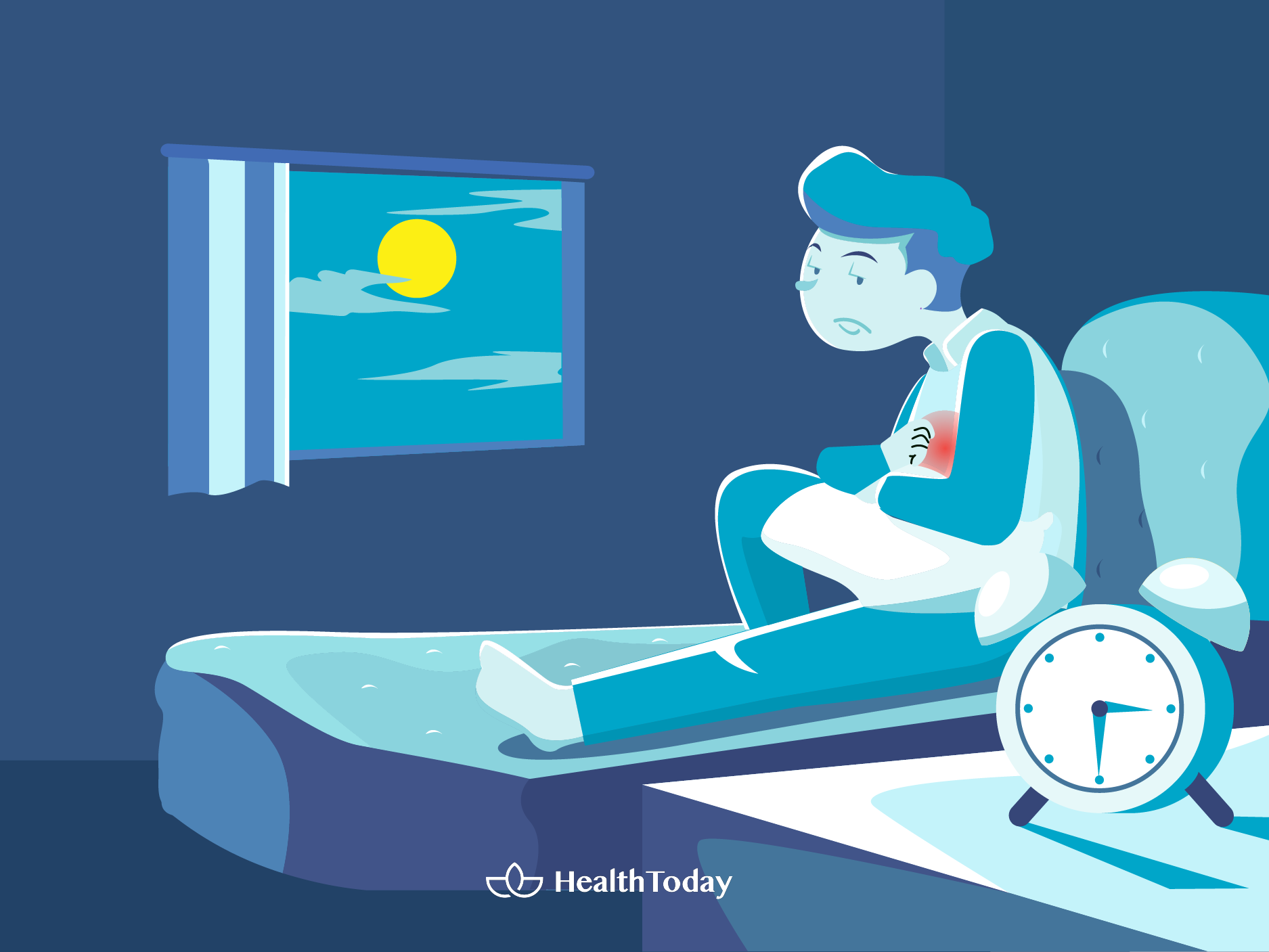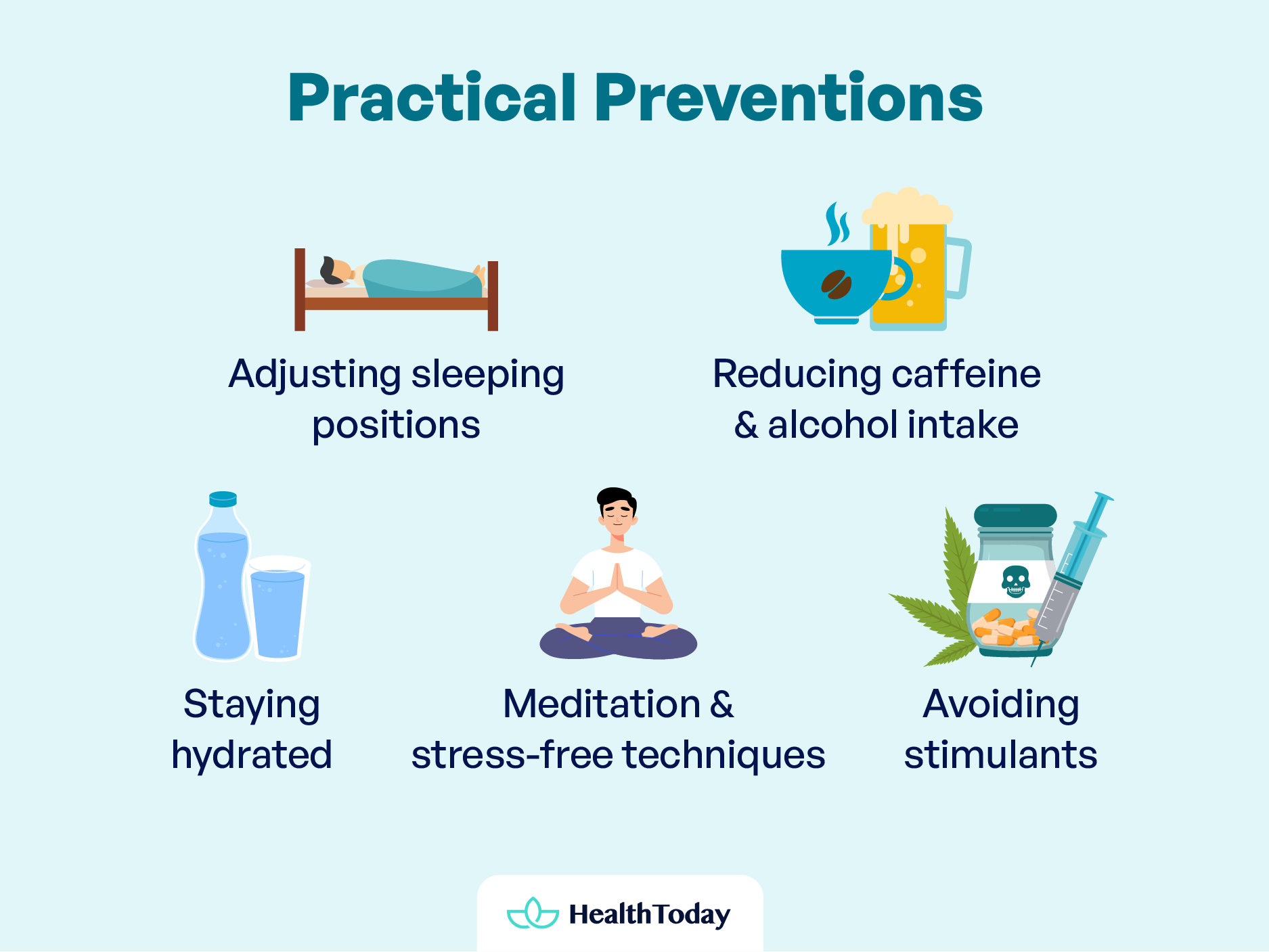Table of Contents
Have you ever woken up in the middle of the night feeling like your heart is about to burst out of your chest? If so, you’re not alone.
People think heart palpitations at night, when lying down, are due to a heart condition, not knowing there are more frequent and harmful causes, such as stress, anxiety, and caffeine. So, what causes these heart palpitations at night?

Heart palpitations at night: Why does my heart race when I lay down?
Palpitation occurs when your heart beats too fast or too hard, flutters, or when you feel that your heart skipped a beat. Many people express these symptoms as bothersome or frightening, especially at night when they wake up with a pounding, racing heart.
Sleep quality is an indicator of variation in HR (heart rate). Several studies have shown that disorders such as OSA (Obstructive syndrome apnea) increase heart rate (1).
An event, such as nightmares, alters the deep sleep stage and influences heart rate, as people wake up in the middle of the night in a state of distress with a rapid heart rate (2).
Can gerd cause palpitations at night?
GERD, or Gastroesophageal Reflux Disease, occurs when stomach acid and food come back into the throat and cause trouble. This can cause heartburn or a sour taste.
But did you know that this stomach trouble can sometimes affect your heart, too?
A particular nerve called the vagus nerve controls your heart rate, and other organs can be affected by GERD.
Studies have shown that sometimes, when your esophagus gets irritated and inflamed, the vagus nerve is stimulated, and the vagal modulation is disturbed by the inflammatory mediators, making the appearance of heart fibrillation (3).
GERD is more frequent at night due to body position, which explains the occurrence of rapid heart rate at night. Seek professional healthcare help for proper management (4).
Alcohol and heart palpitations at night: Is there any link?
You probably already know that drinking too much alcohol isn’t healthy. But when it comes to alcohol and your heart, you might have heard different things. Is alcohol bad for your heart? Is there any relation between alcohol and heart rate?
Many think alcohol is the remedy for the heart, but studies have shown quite the opposite.
Alcohol consumption and heart pathologies are strongly connected; moreover, following a period of binge drinking, often observed during weekends and holidays, people start to express so-called Holiday Heart Syndrome, an irregular heartbeat that can increase your risk of stroke and heart deficiency (5).
Hypothyroidism and heart palpitations at night: What is the connection?
Thyroid disease can make heart problems worse and even create new ones.
Your thyroid gland makes thyroid hormones and controls your metabolism, growth, and other bodily functions. When the thyroid is underactive, it’s called “hypothyroidism.” It usually starts slowly, so you might not notice the symptoms immediately.
Hypothyroidism can be tricky because it often doesn’t have the usual symptoms. Many functions decrease, and symptoms such as constipation, cold and dry skin, puffy eyes, decreased concentration, and more can be seen. When suspected, diagnosis is made by a blood test, which measures the count of thyroid hormones (T4 and TSH).
When there isn’t enough thyroid hormone, the body’s metabolism is low, causing the heart and blood vessels to work improperly. This can weaken the heart and cause it to beat on a lower scale, so-called bradycardia (6).
On the contrary, in hyperthyroidism, the thyroid gland produces more thyroid hormones that accelerate metabolism, resulting in faster heart activity, which explains the accelerated pounding heart rate (6).

Heart palpitations and anxiety
When you’re anxious and experiencing panic attacks, your heart can start to beat faster; this happens because a part of your body called the adrenal glands releases cortisol, and the pituitary gland releases arginine and vasopressin, both responsible for speeding up your heart (7).
It’s like your body getting ready to face a danger, even if it’s not real. This is a natural reaction, like when your body prepares to fight or run away.
So, when you feel anxious, you may experience general symptoms like nervousness, irritability, sweating, and an increased heart rate.
Contact your doctor for a proper diagnosis and treatment if you feel any of these symptoms.


Other causes
Heart palpitations can arise due to a myriad of factors and circumstances. They can be triggered by various influences, both external and internal. These influences may include emotional and psychological elements, such as stress, anxiety, and intense excitement, which can incite the release of adrenaline and accelerate the heart’s rhythm (8).
Additionally, everyday habits like the consumption of caffeinated beverages, such as coffee and energy drinks, as well as the use of tobacco products like cigarettes, can provide the heart with stimulants that may lead to palpitations (9).
Moreover, underlying medical conditions, such as dysrhythmia, define problems with the electrical activity of your heart and other disrupted-producing glands, such as hyperthyroidism and pheochromocytoma.
Other external influences that can be underlying are anemia, physical exercise, hypoglycemia, dehydration, or pregnancy.
Certain medications can also cause heart palpitations, like pseudoephedrine-induced medications in nasal sprays and asthma inhalers, by increasing blood pressure (10).
Therefore, the origins of these sensations are multifaceted, and understanding the potential causes is important for recognizing and addressing this phenomenon.
When to worry?
Heart palpitations are a frequent motif of consulting. Many causes can be benign, but can also be underlying a more serious condition, especially associated with the following symptoms:
- Difficulty in breathing (dyspnea)
- Loss or fading consciousness (syncope)
- Acute abdominal or chest pain (angina)
- Sudden swellings in the leg (edema)
Any occurrence of these symptoms needs immediate professional medical assistance (11).





Practical preventions that you can do every day
Taking proactive steps to manage heart palpitations can significantly improve your quality of life. From simple lifestyle adjustments to mindful practices, integrating these habits into your daily routine can make a noticeable difference in reducing palpitation frequency and intensity.


Best sleeping position for heart palpitations
Heart palpitations can become more pronounced when lying on your left side. This is due to the heart’s positioning on the left side of your chest. When you lie on your left side, your heart gets closer to the chest wall, making any irregular beats or skipped heartbeats more noticeable.
If you experience heart palpitations while lying down, you can try changing your position to your right side to see if it alleviates the sensation. This shift in posture may sometimes help reduce the intensity of the palpitations (12).
Five practical tips
- Reduce your caffeine intake before bedtime: Caffeine acts as a stimulant and can contribute to palpitations in some individuals. Reducing your caffeine can minimize your symptoms and your heart rate (13).
- Steer clear of alcohol: Alcohol can irritate the heart’s electrical system, lead to dehydration, and cause electrolyte imbalances, all of which may result in heart palpitations. It’s advisable to limit alcohol intake to minimize its adverse effects on the heart (14).
- Maintain proper hydration: Dehydration can disrupt the balance of electrolytes in your body and increase the likelihood of palpitations. Many people, especially as they age, tend not to consume enough water since our natural thirst drive decreases over time. It is generally recommended that most individuals aim to drink between 2 and 3 liters of water per day (15, 16).
- Meditation and stress-free techniques: Engaging in appeasing activities such as meditation, yoga, and deep breathing exercises can effectively reduce stress, which, in turn, helps calm the heart’s electrical system and erase palpitations (17).
- Avoid stimulants: Substances like nicotine, specific over-the-counter cold medications, and recreational drugs such as cocaine and methamphetamine are stimulants that can trigger heart palpitations. Staying away from these stimulants can help reduce the occurrence of palpitations. Seek medical assistance if necessary.





Does your heart stop when you sleep?
You might have asked yourself this question before. The answer is simple: No, the heart doesn’t stop pumping. However, the heart rate can drop by 20 percent during deep sleep.
Hot flashes and heart palpitations at night, is it okay?
Hot flashes are when menopausal women feel various symptoms, such as intense heat and warmth in the chest, neck, and face.
-Flushing or reddened face.
-Perspirations.
-Irregular and rapid heartbeat (18).
Is heart rate 100 while sleeping normal?
The maximal heart rate is calculated by the equation (age—220) during exercise, but during sleep, the minimum heart rate during sleep varies from 40 to 60 beats per minute, while the maximum can reach approximately 100 beats per minute. We advise seeing a doctor to exclude any potential problem (19).
Why do I hear my heartbeat when I lie down?
Hearing a heartbeat while lying down is normal, especially if you’re on your left side, as the heart rests on the left side of your chest wall. Moreover, when you’re stressed, you become more conscious and irritable with any external sounds, and it becomes more acute.
However, pulsatile tinnitus, a repeated beating sound in your ear, can also be a cause and shouldn’t be ignored as it may underlie a serious medical condition. Seek medical attention for more evaluations.
Why do I wake up shaking and my heart racing?
Numerous factors can cause a person to awaken with a racing heart, including stress, inadequate sleep, sleep apnea, and even nightmares. At times, individuals may experience an abrupt awakening with their heart pounding rapidly or throbbing within their chest. This sensation may also be accompanied by a sense of trembling or alertness, which might be due to panic attacks; if so, we advise you to see a doctor for more evaluations.





Summary
To summarize, heart palpitations at night, described as fluttering or racing sensations in the chest, are attributed to various factors. They can undoubtedly be bothersome, particularly when experienced at night.
While some may attribute these palpitations to underlying heart conditions, they can be caused by common factors like stress, anxiety, and caffeine.
There are a lot of preventive measures, such as adjusting sleeping positions, reducing caffeine and alcohol intake, staying hydrated, practicing stress-reduction techniques, and avoiding stimulants.
If you have heart palpitations, talk to your doctor to exclude any serious condition and avoid further complications.

















Comments
0